
Auto-Deep-Research
Your Fully-Automated Personal AI Assistant, and Open-Source & Cost-Efficient Alternative to OpenAI's Deep Research
Stars: 163
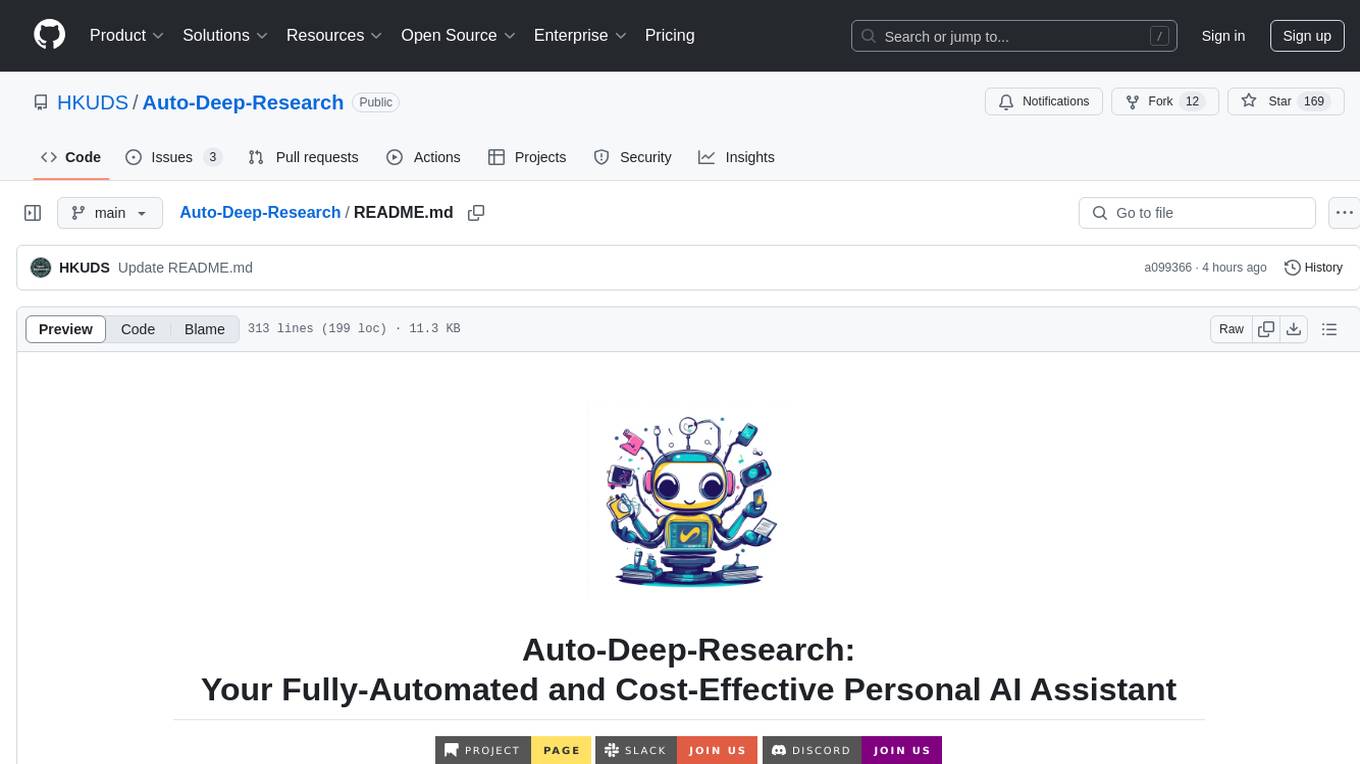
Auto-Deep-Research is an open-source and cost-efficient alternative to OpenAI's Deep Research, based on the AutoAgent framework. It offers high performance, universal LLM support, flexible interaction, cost-efficiency, file support, and one-click launch. Users can seamlessly integrate with various LLMs, handle file uploads, and start instantly with a simple command. The tool aims to provide a fully-automated and personalized AI assistant at a lower cost, catering to community needs and showcasing the potential of AutoAgent for practical AI applications.
README:
Welcome to Auto-Deep-Research! Auto-Deep-Research is a open-source and cost-efficient alternative to OpenAI's Deep Research, based on AutoAgent framework.
- 🏆 High Performance: Ranks the #1 spot among open-sourced methods, delivering comparable performance to OpenAI's Deep Research.
- 🌐 Universal LLM Support: Seamlessly integrates with A Wide Range of LLMs (e.g., OpenAI, Anthropic, Deepseek, vLLM, Grok, Huggingface ...)
- 🔀 Flexible Interaction: Supports both function-calling and non-function-calling interaction LLMs.
- 💰 Cost-Efficient: Open-source alternative to Deep Research's $200/month subscription with your own pay-as-you-go LLM API keys.
- 📁 File Support: Handles file uploads for enhanced data interaction
- 🚀 One-Click Launch: Get started instantly with a simple
auto deep-researchcommand - Zero Configuration needed, truly out-of-the-box experience.
🚀 Own your own personal assistant with much lower cost. Try 🔥Auto-Deep-Research🔥 Now!
- [2025, Feb 16]: 🎉🎉We've cleaned up the codebase of AutoAgent, removed the irrelevant parts for Auto-Deep-Research and released the first version of Auto-Deep-Research.
- ✨ Features
- 🔥 News
- 🧐 Why to release Auto-Deep-Research?
- ⚡ Quick Start
- ☑️ Todo List
- 📖 Documentation
- 🤝 Join the Community
- 🙏 Acknowledgements
- 🌟 Cite
After releasing AutoAgent (previously known as MetaChain) for a week, we've observed three compelling reasons to introduce Auto-Deep-Research:
-
Community Interest We noticed significant community interest in our Deep Research alternative functionality. In response, we've streamlined the codebase by removing non-Deep-Research related components to create a more focused tool.
-
Framework Extensibility Auto-Deep-Research serves as the first ready-to-use product built on AutoAgent, demonstrating how quickly and easily you can create powerful Agent Apps using our framework.
-
Community-Driven Improvements We've incorporated valuable community feedback from the first week, introducing features like one-click launch and enhanced LLM compatibility to make the tool more accessible and versatile.
Auto-Deep-Research represents our commitment to both the community's needs and the demonstration of AutoAgent's potential as a foundation for building practical AI applications.
conda create -n auto_deep_research python=3.10
conda activate auto_deep_research
git clone https://github.com/HKUDS/Auto-Deep-Research.git
cd Auto-Deep-Research
pip install -e .We use Docker to containerize the agent-interactive environment. So please install Docker first. You don't need to manually pull the pre-built image, because we have let Auto-Deep-Research automatically pull the pre-built image based on your architecture of your machine.
Create a environment variable file, just like .env.template, and set the API keys for the LLMs you want to use. Not every LLM API Key is required, use what you need.
You can run auto deep-research to start Auto-Deep-Research. Some configuration of this command is shown below.
-
--container_name: Name of the Docker container (default: 'deepresearch') -
--port: Port for the container (default: 12346) -
COMPLETION_MODEL: Specify the LLM model to use, you should follow the name of Litellm to set the model name. (Default:claude-3-5-sonnet-20241022) -
DEBUG: Enable debug mode for detailed logs (default: False) -
API_BASE_URL: The base URL for the LLM provider (default: None) -
FN_CALL: Enable function calling (default: None). Most of time, you could ignore this option because we have already set the default value based on the model name.
We will show you how easy it is to start Auto-Deep-Research with different LLM providers.
- set the
ANTHROPIC_API_KEYin the.envfile.
ANTHROPIC_API_KEY=your_anthropic_api_key- run the following command to start Auto-Deep-Research.
auto deep-research # default model is claude-3-5-sonnet-20241022- set the
OPENAI_API_KEYin the.envfile.
OPENAI_API_KEY=your_openai_api_key- run the following command to start Auto-Deep-Research.
COMPLETION_MODEL=gpt-4o auto deep-research- set the
MISTRAL_API_KEYin the.envfile.
MISTRAL_API_KEY=your_mistral_api_key- run the following command to start Auto-Deep-Research.
COMPLETION_MODEL=mistral/mistral-large-2407 auto deep-research- set the
GEMINI_API_KEYin the.envfile.
GEMINI_API_KEY=your_gemini_api_key- run the following command to start Auto-Deep-Research.
COMPLETION_MODEL=gemini/gemini-2.0-flash auto deep-research- set the
HUGGINGFACE_API_KEYin the.envfile.
HUGGINGFACE_API_KEY=your_huggingface_api_key- run the following command to start Auto-Deep-Research.
COMPLETION_MODEL=huggingface/meta-llama/Llama-3.3-70B-Instruct auto deep-research- set the
GROQ_API_KEYin the.envfile.
GROQ_API_KEY=your_groq_api_key- run the following command to start Auto-Deep-Research.
COMPLETION_MODEL=groq/deepseek-r1-distill-llama-70b auto deep-research- set the
OPENAI_API_KEYin the.envfile.
OPENAI_API_KEY=your_api_key_for_openai_compatible_endpoints- run the following command to start Auto-Deep-Research.
COMPLETION_MODEL=openai/grok-2-latest API_BASE_URL=https://api.x.ai/v1 auto deep-researchWe recommend using OpenRouter as LLM provider of DeepSeek-R1 temporarily. Because official API of DeepSeek-R1 can not be used efficiently.
- set the
OPENROUTER_API_KEYin the.envfile.
OPENROUTER_API_KEY=your_openrouter_api_key- run the following command to start Auto-Deep-Research.
COMPLETION_MODEL=openrouter/deepseek/deepseek-r1 auto deep-research- set the
DEEPSEEK_API_KEYin the.envfile.
DEEPSEEK_API_KEY=your_deepseek_api_key- run the following command to start Auto-Deep-Research.
COMPLETION_MODEL=deepseek/deepseek-chat auto deep-researchYou can import the browser cookies to the browser environment to let the agent better access some specific websites. For more details, please refer to the cookies folder.
More features coming soon! 🚀 Web GUI interface under development.
Auto-Deep-Research is continuously evolving! Here's what's coming:
- 🖥️ GUI Agent: Supporting Computer-Use agents with GUI interaction
- 🏗️ Code Sandboxes: Supporting additional environments like E2B
- 🎨 Web Interface: Developing comprehensive GUI for better user experience
Have ideas or suggestions? Feel free to open an issue! Stay tuned for more exciting updates! 🚀
A more detailed documentation is coming soon 🚀, and we will update in the Documentation page.
If you think the Auto-Deep-Research is helpful, you can join our community by:
- Join our Slack workspace - Here we talk about research, architecture, and future development.
- Join our Discord server - This is a community-run server for general discussion, questions, and feedback.
- Read or post Github Issues - Check out the issues we're working on, or add your own ideas.
Rome wasn't built in a day. Auto-Deep-Research is built on the AutoAgent framework. We extend our sincere gratitude to all the pioneering works that have shaped AutoAgent, including OpenAI Swarm for framework architecture inspiration, Magentic-one for the three-agent design insights, OpenHands for documentation structure, and many other excellent projects that contributed to agent-environment interaction design. Your innovations have been instrumental in making both AutoAgent and Auto-Deep-Research possible.
@misc{AutoAgent,
title={{AutoAgent: A Fully-Automated and Zero-Code Framework for LLM Agents}},
author={Jiabin Tang, Tianyu Fan, Chao Huang},
year={2025},
eprint={202502.05957},
archivePrefix={arXiv},
primaryClass={cs.AI},
url={https://arxiv.org/abs/2502.05957},
}For Tasks:
Click tags to check more tools for each tasksFor Jobs:
Alternative AI tools for Auto-Deep-Research
Similar Open Source Tools

Auto-Deep-Research
Auto-Deep-Research is an open-source and cost-efficient alternative to OpenAI's Deep Research, based on the AutoAgent framework. It offers high performance, universal LLM support, flexible interaction, cost-efficiency, file support, and one-click launch. Users can seamlessly integrate with various LLMs, handle file uploads, and start instantly with a simple command. The tool aims to provide a fully-automated and personalized AI assistant at a lower cost, catering to community needs and showcasing the potential of AutoAgent for practical AI applications.
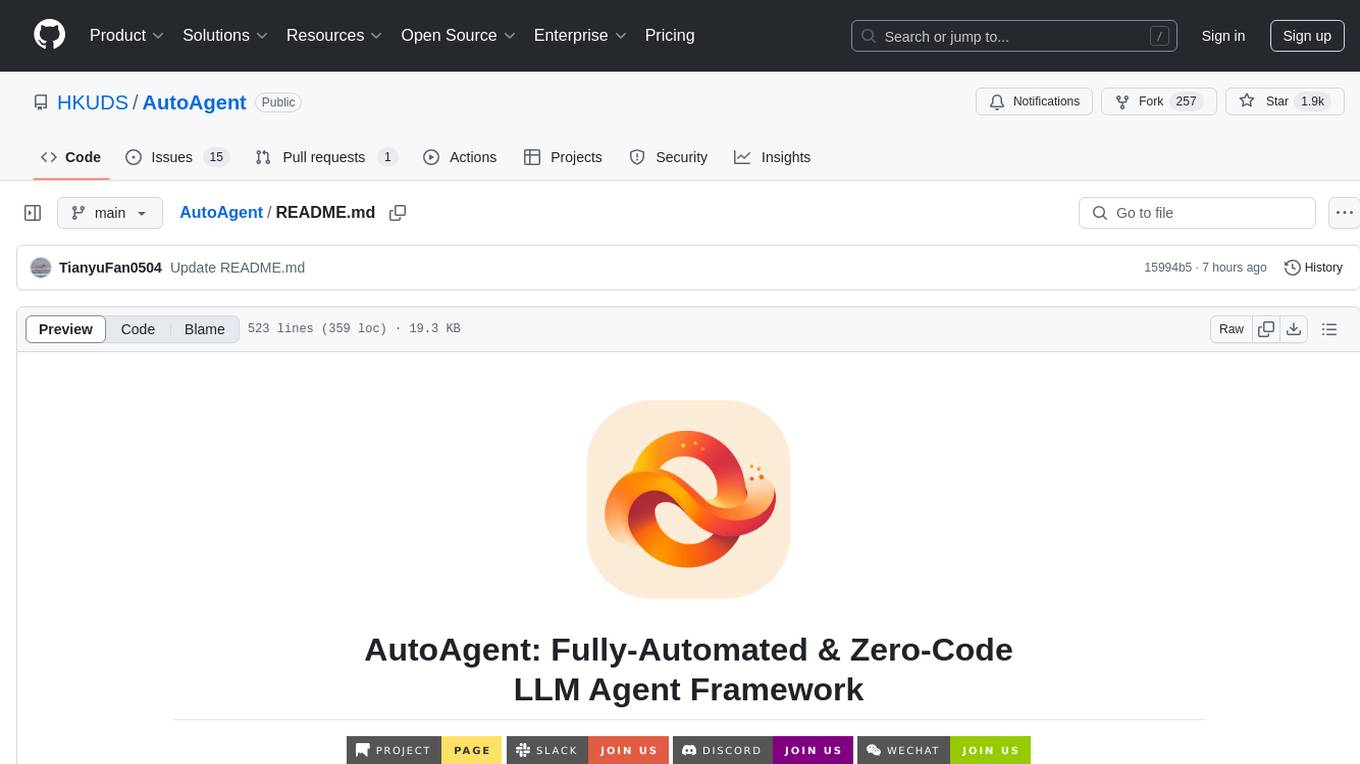
AutoAgent
AutoAgent is a fully-automated and zero-code framework that enables users to create and deploy LLM agents through natural language alone. It is a top performer on the GAIA Benchmark, equipped with a native self-managing vector database, and allows for easy creation of tools, agents, and workflows without any coding. AutoAgent seamlessly integrates with a wide range of LLMs and supports both function-calling and ReAct interaction modes. It is designed to be dynamic, extensible, customized, and lightweight, serving as a personal AI assistant.
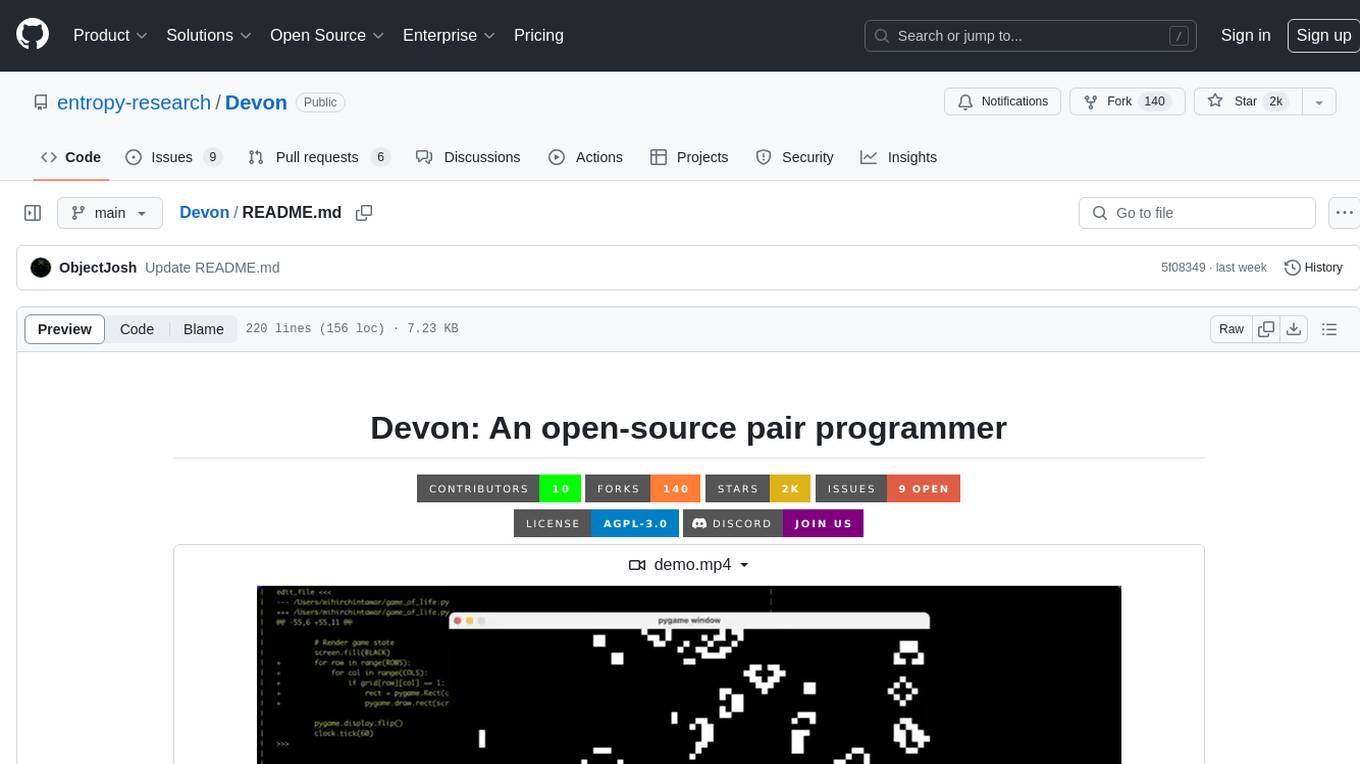
Devon
Devon is an open-source pair programmer tool designed to facilitate collaborative coding sessions. It provides features such as multi-file editing, codebase exploration, test writing, bug fixing, and architecture exploration. The tool supports Anthropic, OpenAI, and Groq APIs, with plans to add more models in the future. Devon is community-driven, with ongoing development goals including multi-model support, plugin system for tool builders, self-hostable Electron app, and setting SOTA on SWE-bench Lite. Users can contribute to the project by developing core functionality, conducting research on agent performance, providing feedback, and testing the tool.
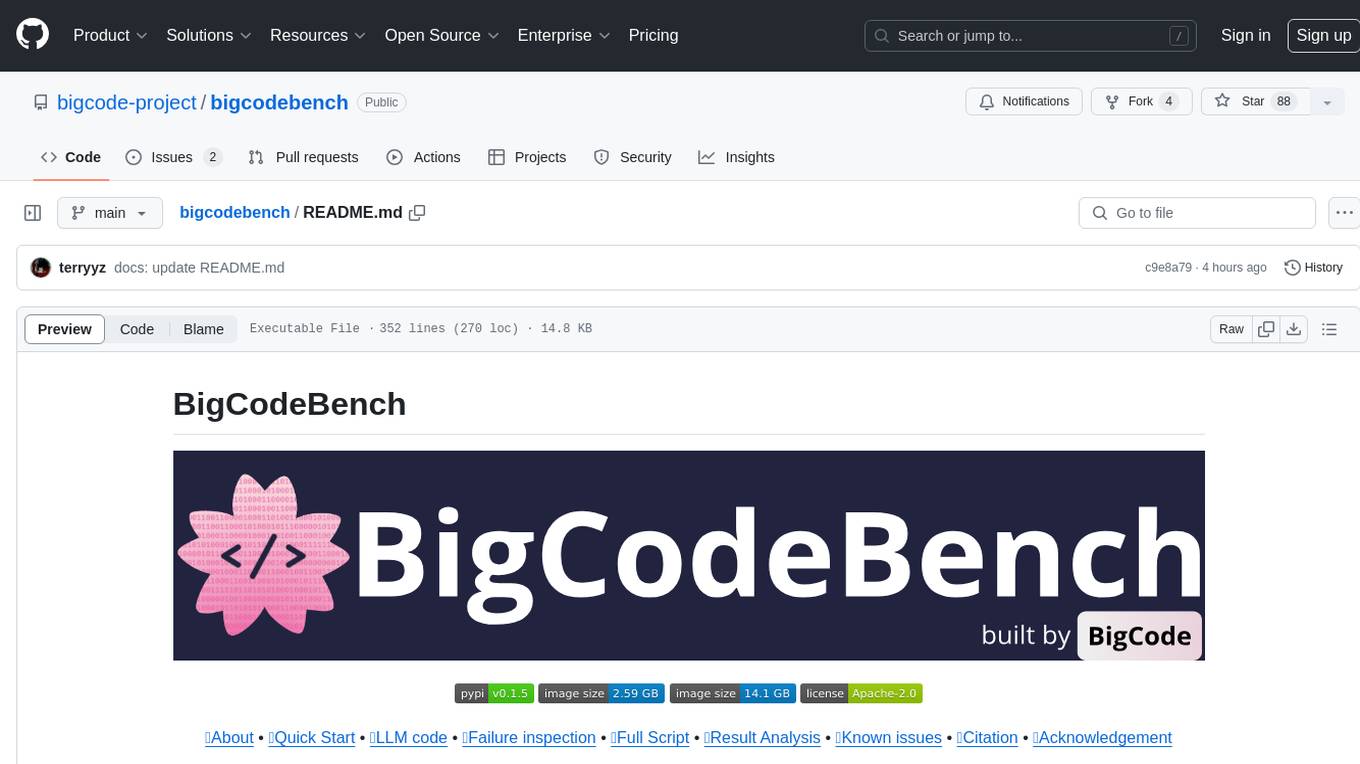
bigcodebench
BigCodeBench is an easy-to-use benchmark for code generation with practical and challenging programming tasks. It aims to evaluate the true programming capabilities of large language models (LLMs) in a more realistic setting. The benchmark is designed for HumanEval-like function-level code generation tasks, but with much more complex instructions and diverse function calls. BigCodeBench focuses on the evaluation of LLM4Code with diverse function calls and complex instructions, providing precise evaluation & ranking and pre-generated samples to accelerate code intelligence research. It inherits the design of the EvalPlus framework but differs in terms of execution environment and test evaluation.
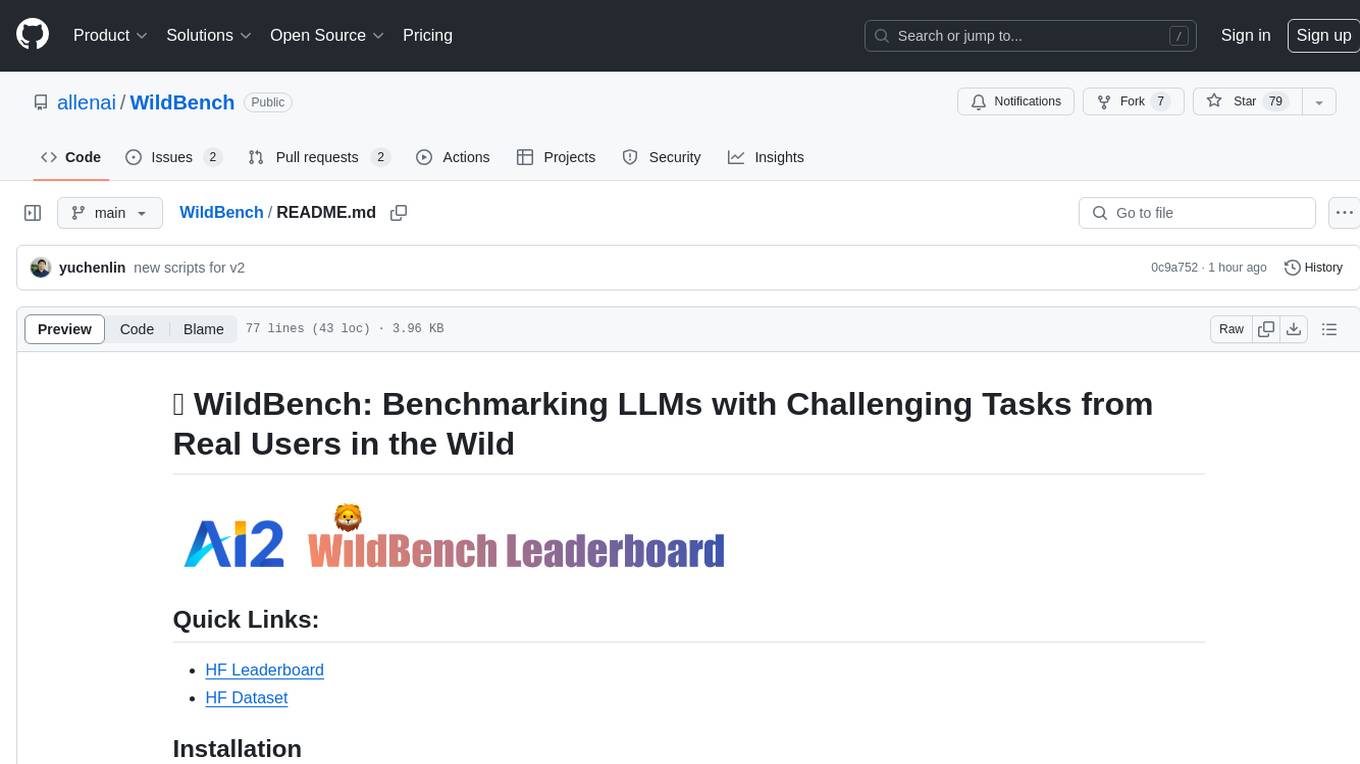
WildBench
WildBench is a tool designed for benchmarking Large Language Models (LLMs) with challenging tasks sourced from real users in the wild. It provides a platform for evaluating the performance of various models on a range of tasks. Users can easily add new models to the benchmark by following the provided guidelines. The tool supports models from Hugging Face and other APIs, allowing for comprehensive evaluation and comparison. WildBench facilitates running inference and evaluation scripts, enabling users to contribute to the benchmark and collaborate on improving model performance.
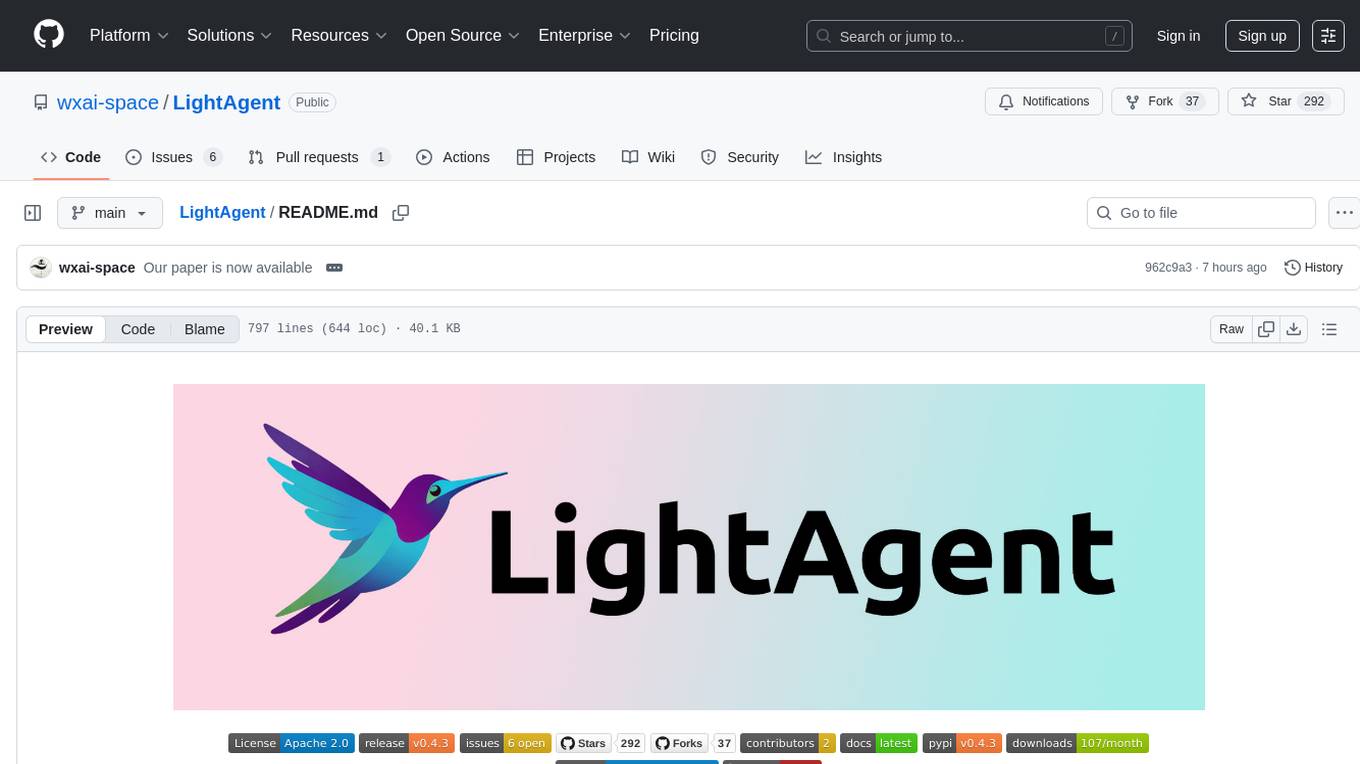
LightAgent
LightAgent is a lightweight, open-source Agentic AI development framework with memory, tools, and a tree of thought. It supports multi-agent collaboration, autonomous learning, tool integration, complex task handling, and multi-model support. It also features a streaming API, tool generator, agent self-learning, adaptive tool mechanism, and more. LightAgent is designed for intelligent customer service, data analysis, automated tools, and educational assistance.
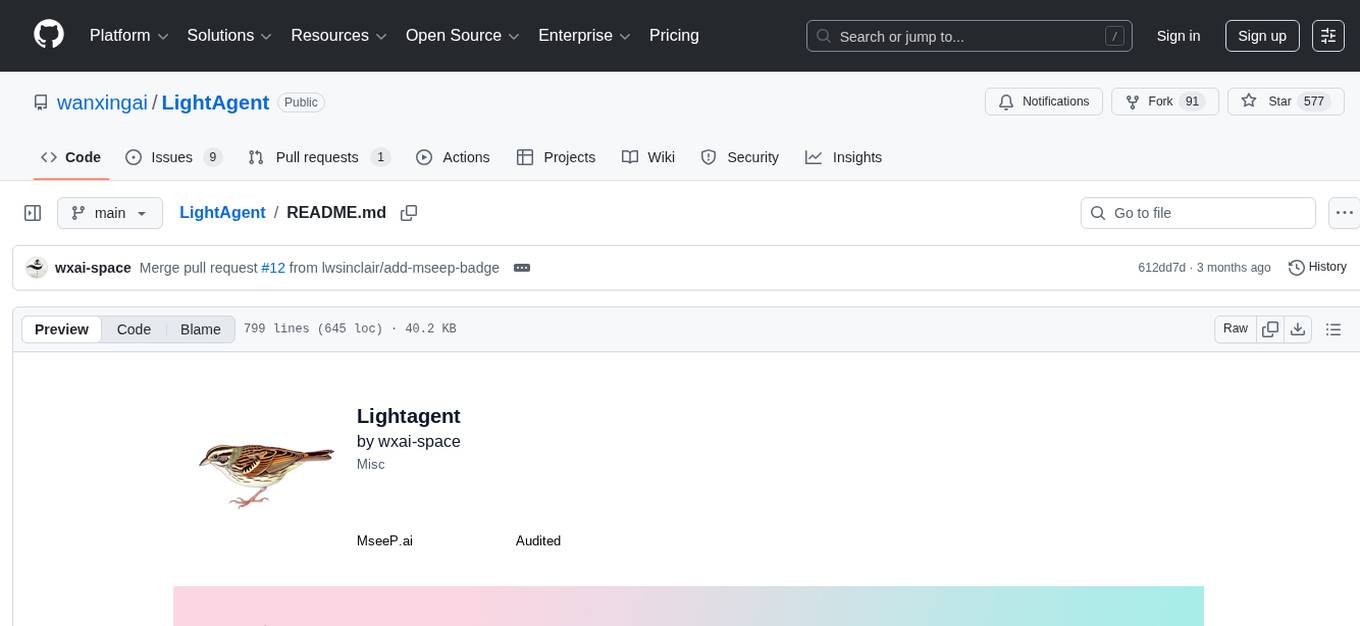
LightAgent
LightAgent is a lightweight, open-source active Agentic AI development framework with memory, tools, and a tree of thought. It supports multi-agent collaboration, autonomous learning, tool integration, complex goals, and multi-model support. It enables simpler self-learning agents, seamless integration with major chat frameworks, and quick tool generation. LightAgent also supports memory modules, tool integration, tree of thought planning, multi-agent collaboration, streaming API, agent self-learning, Langfuse log tracking, and agent assessment. It is compatible with various large models and offers features like intelligent customer service, data analysis, automated tools, and educational assistance.
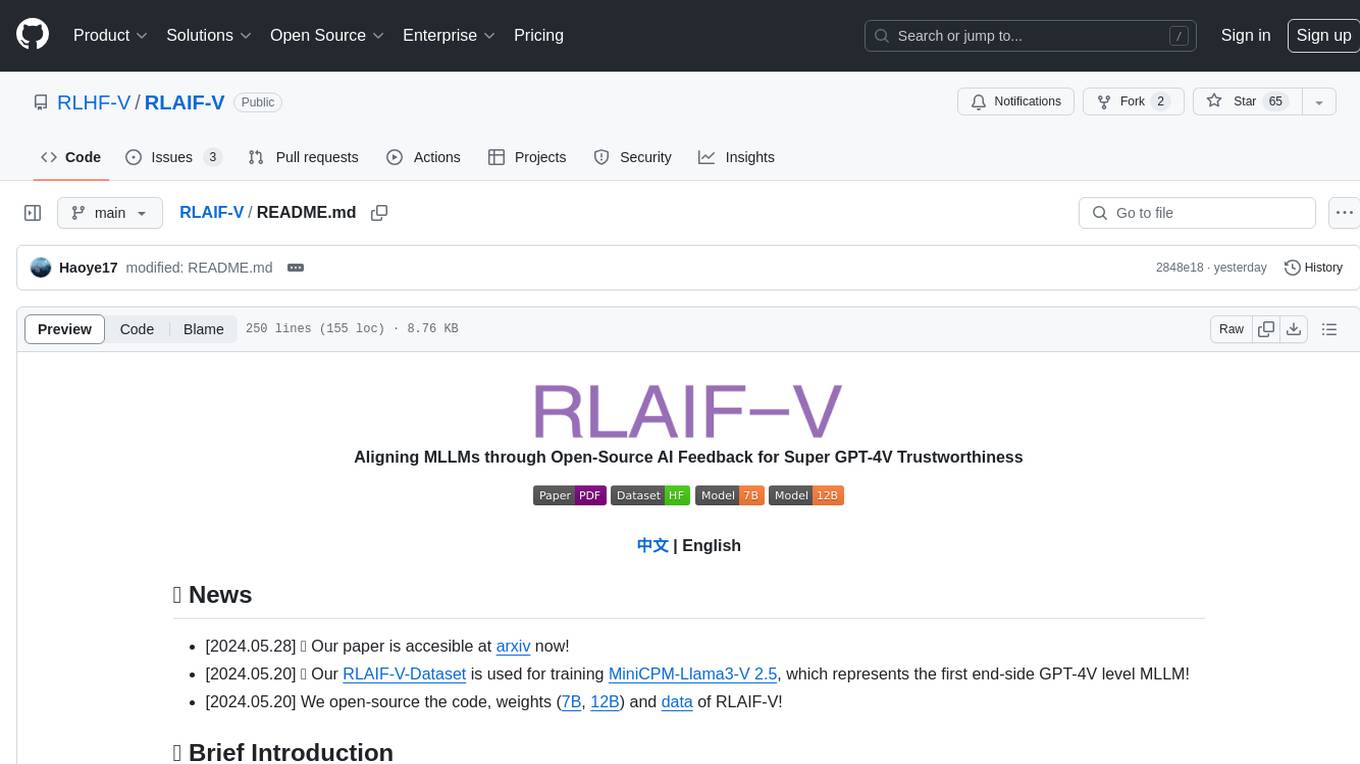
RLAIF-V
RLAIF-V is a novel framework that aligns MLLMs in a fully open-source paradigm for super GPT-4V trustworthiness. It maximally exploits open-source feedback from high-quality feedback data and online feedback learning algorithm. Notable features include achieving super GPT-4V trustworthiness in both generative and discriminative tasks, using high-quality generalizable feedback data to reduce hallucination of different MLLMs, and exhibiting better learning efficiency and higher performance through iterative alignment.
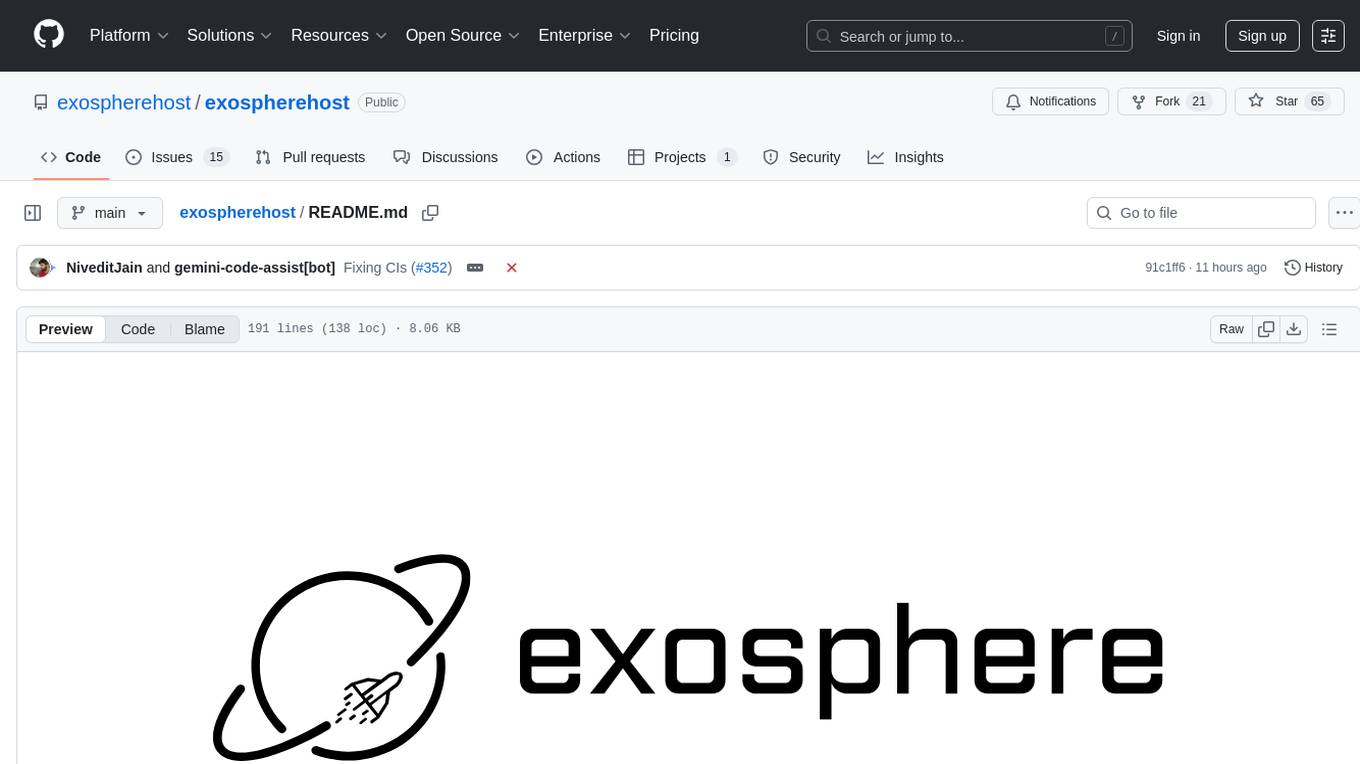
exospherehost
Exosphere is an open source infrastructure designed to run AI agents at scale for large data and long running flows. It allows developers to define plug and playable nodes that can be run on a reliable backbone in the form of a workflow, with features like dynamic state creation at runtime, infinite parallel agents, persistent state management, and failure handling. This enables the deployment of production agents that can scale beautifully to build robust autonomous AI workflows.
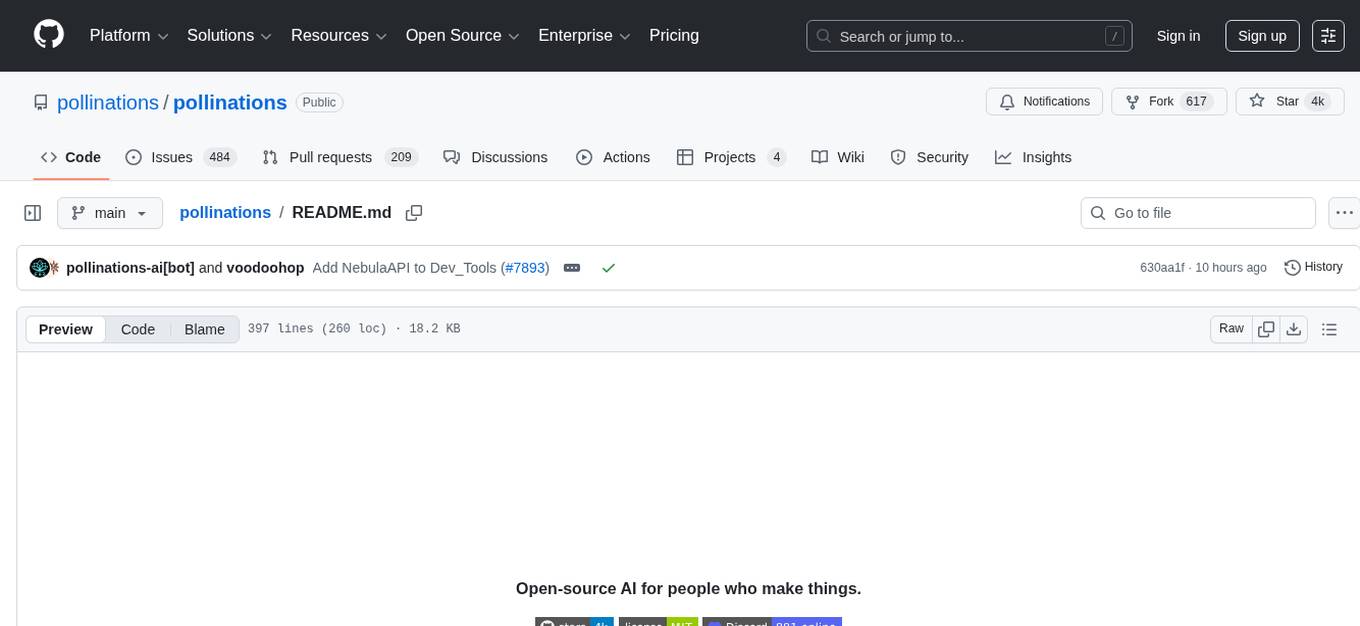
pollinations
pollinations.ai is an open-source generative AI platform based in Berlin, empowering community projects with accessible text, image, video, and audio generation APIs. It offers a unified API endpoint for various AI generation needs, including text, images, audio, and video. The platform provides features like image generation using models such as Flux, GPT Image, Seedream, and Kontext, video generation with Seedance and Veo, and audio generation with text-to-speech and speech-to-text capabilities. Users can access the platform through a web interface or API, and authentication is managed through API keys. The platform is community-driven, transparent, and ethical, aiming to make AI technology open, accessible, and interconnected while fostering innovation and responsible development.
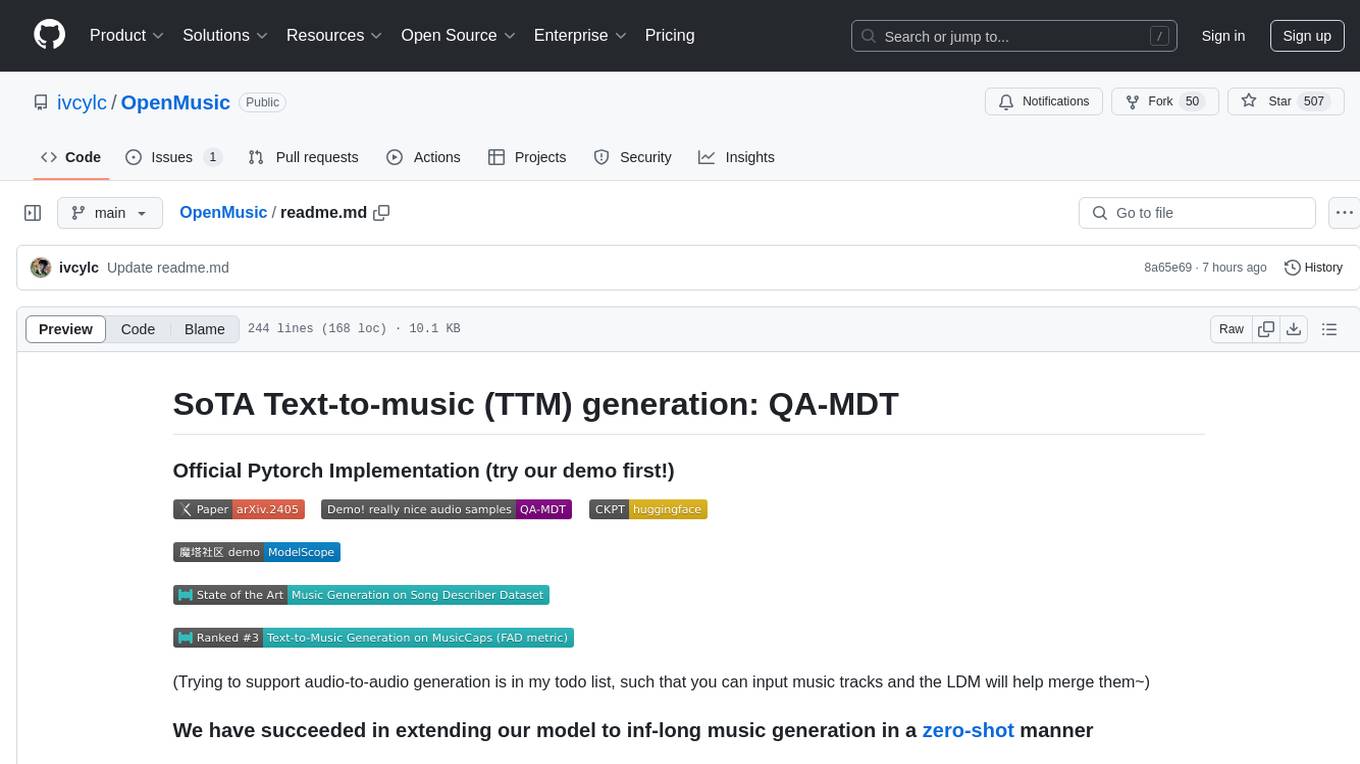
OpenMusic
OpenMusic is a repository providing an implementation of QA-MDT, a Quality-Aware Masked Diffusion Transformer for music generation. The code integrates state-of-the-art models and offers training strategies for music generation. The repository includes implementations of AudioLDM, PixArt-alpha, MDT, AudioMAE, and Open-Sora. Users can train or fine-tune the model using different strategies and datasets. The model is well-pretrained and can be used for music generation tasks. The repository also includes instructions for preparing datasets, training the model, and performing inference. Contact information is provided for any questions or suggestions regarding the project.
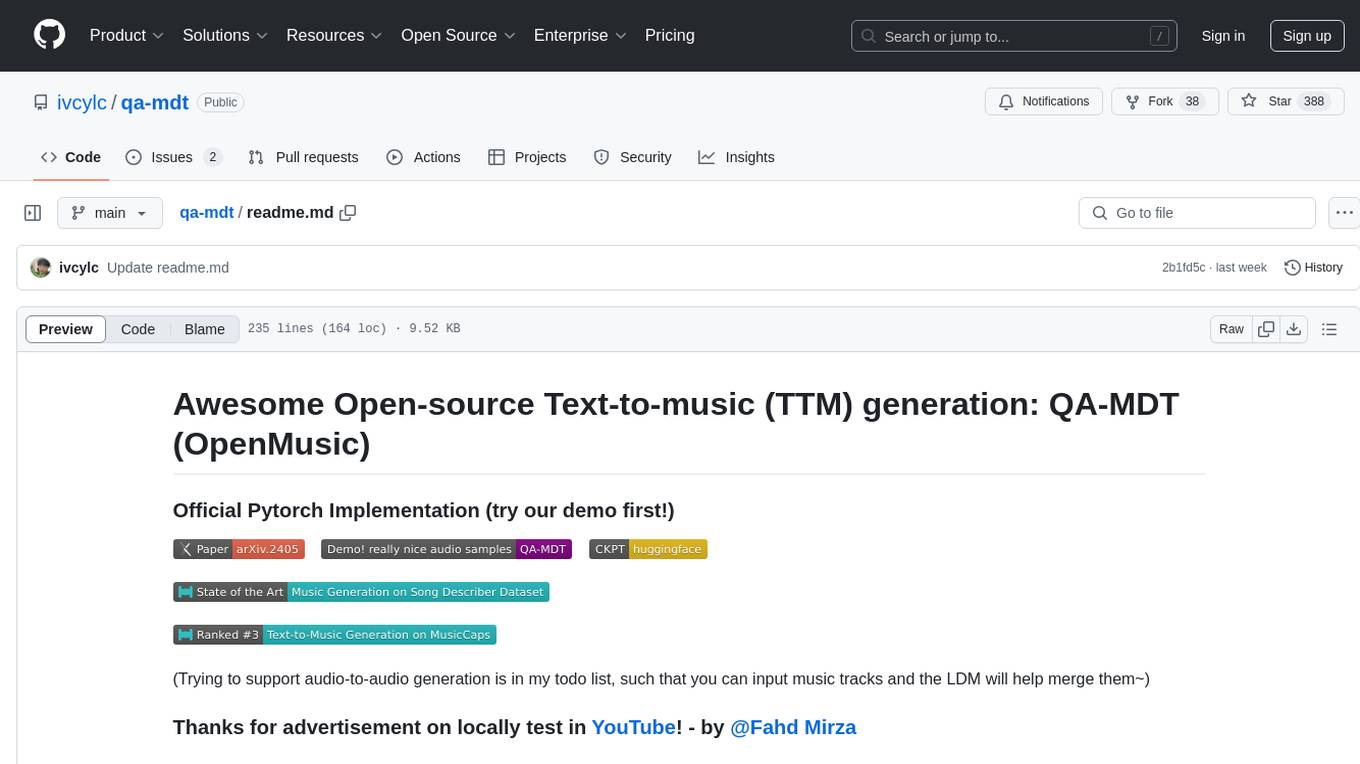
qa-mdt
This repository provides an implementation of QA-MDT, integrating state-of-the-art models for music generation. It offers a Quality-Aware Masked Diffusion Transformer for enhanced music generation. The code is based on various repositories like AudioLDM, PixArt-alpha, MDT, AudioMAE, and Open-Sora. The implementation allows for training and fine-tuning the model with different strategies and datasets. The repository also includes instructions for preparing datasets in LMDB format and provides a script for creating a toy LMDB dataset. The model can be used for music generation tasks, with a focus on quality injection to enhance the musicality of generated music.
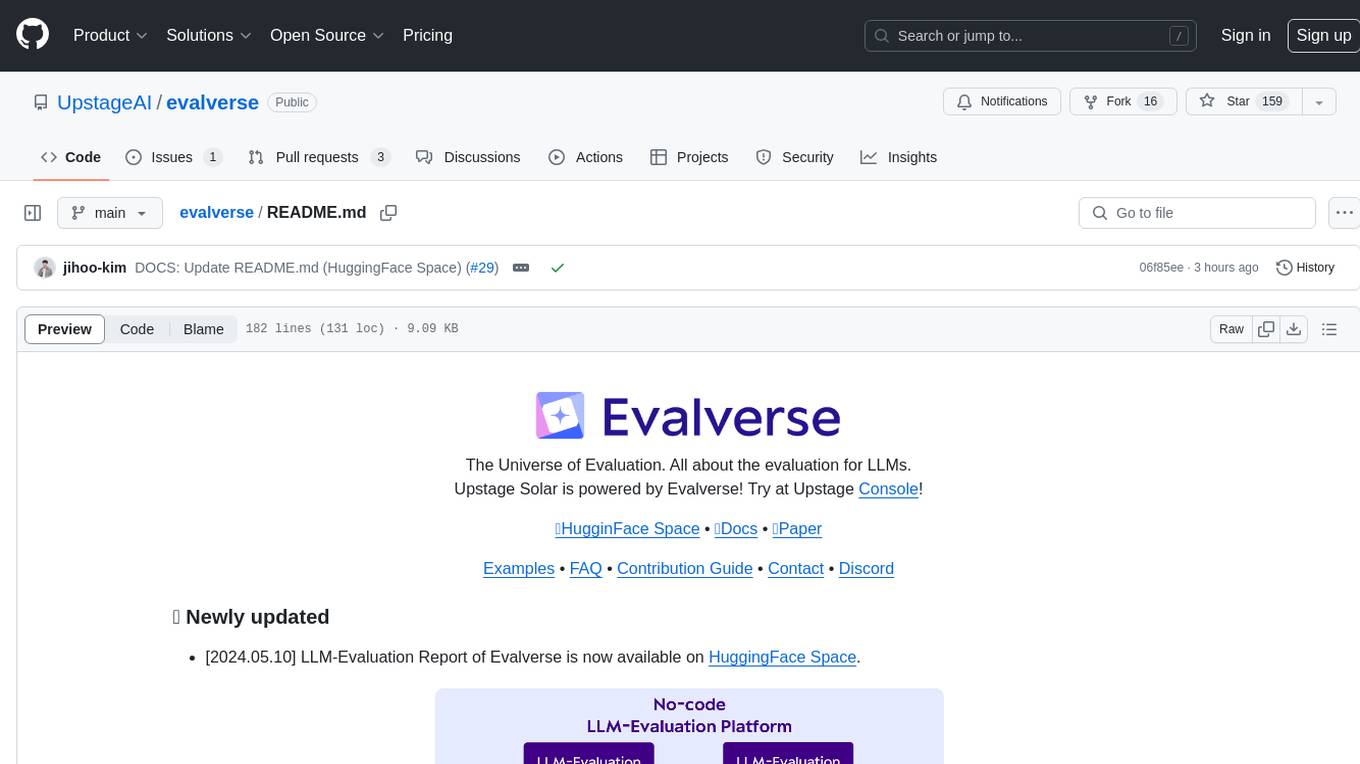
evalverse
Evalverse is an open-source project designed to support Large Language Model (LLM) evaluation needs. It provides a standardized and user-friendly solution for processing and managing LLM evaluations, catering to AI research engineers and scientists. Evalverse supports various evaluation methods, insightful reports, and no-code evaluation processes. Users can access unified evaluation with submodules, request evaluations without code via Slack bot, and obtain comprehensive reports with scores, rankings, and visuals. The tool allows for easy comparison of scores across different models and swift addition of new evaluation tools.
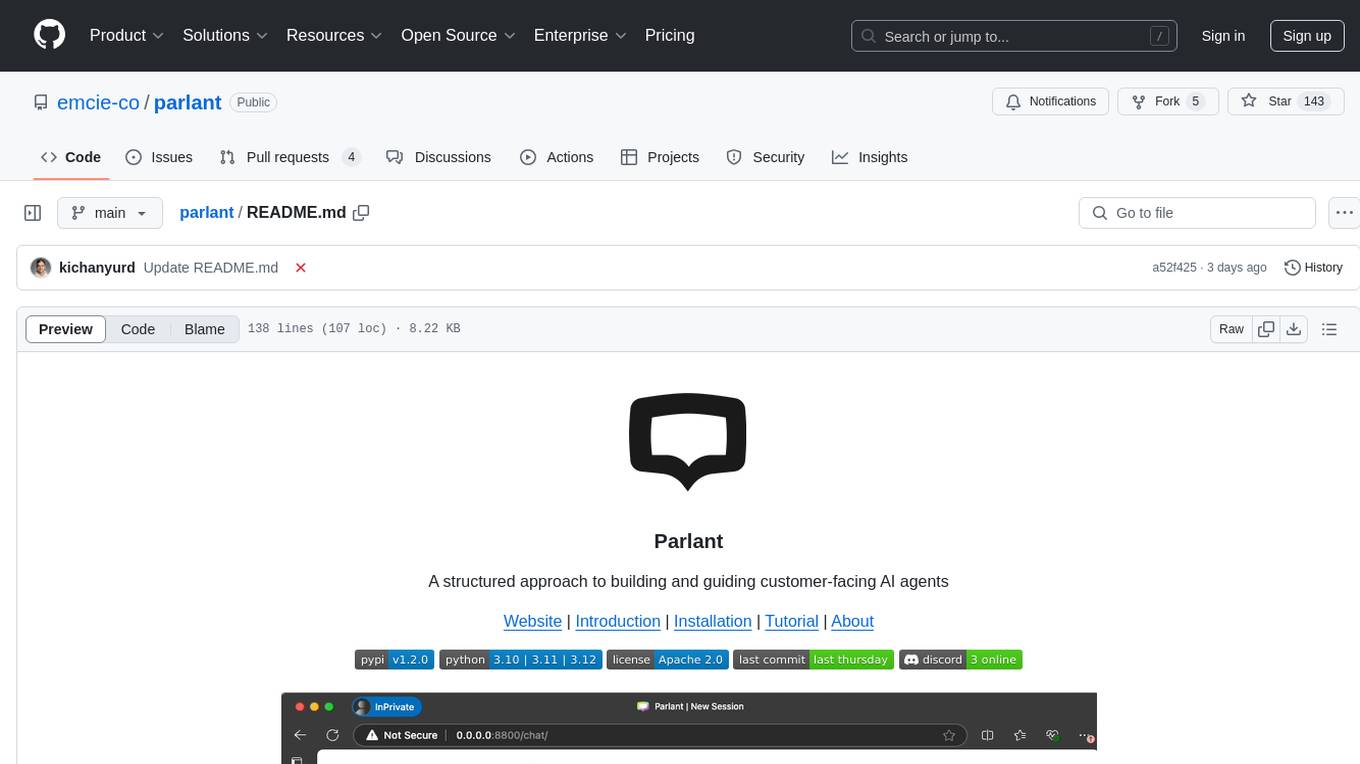
parlant
Parlant is a structured approach to building and guiding customer-facing AI agents. It allows developers to create and manage robust AI agents, providing specific feedback on agent behavior and helping understand user intentions better. With features like guidelines, glossary, coherence checks, dynamic context, and guided tool use, Parlant offers control over agent responses and behavior. Developer-friendly aspects include instant changes, Git integration, clean architecture, and type safety. It enables confident deployment with scalability, effective debugging, and validation before deployment. Parlant works with major LLM providers and offers client SDKs for Python and TypeScript. The tool facilitates natural customer interactions through asynchronous communication and provides a chat UI for testing new behaviors before deployment.
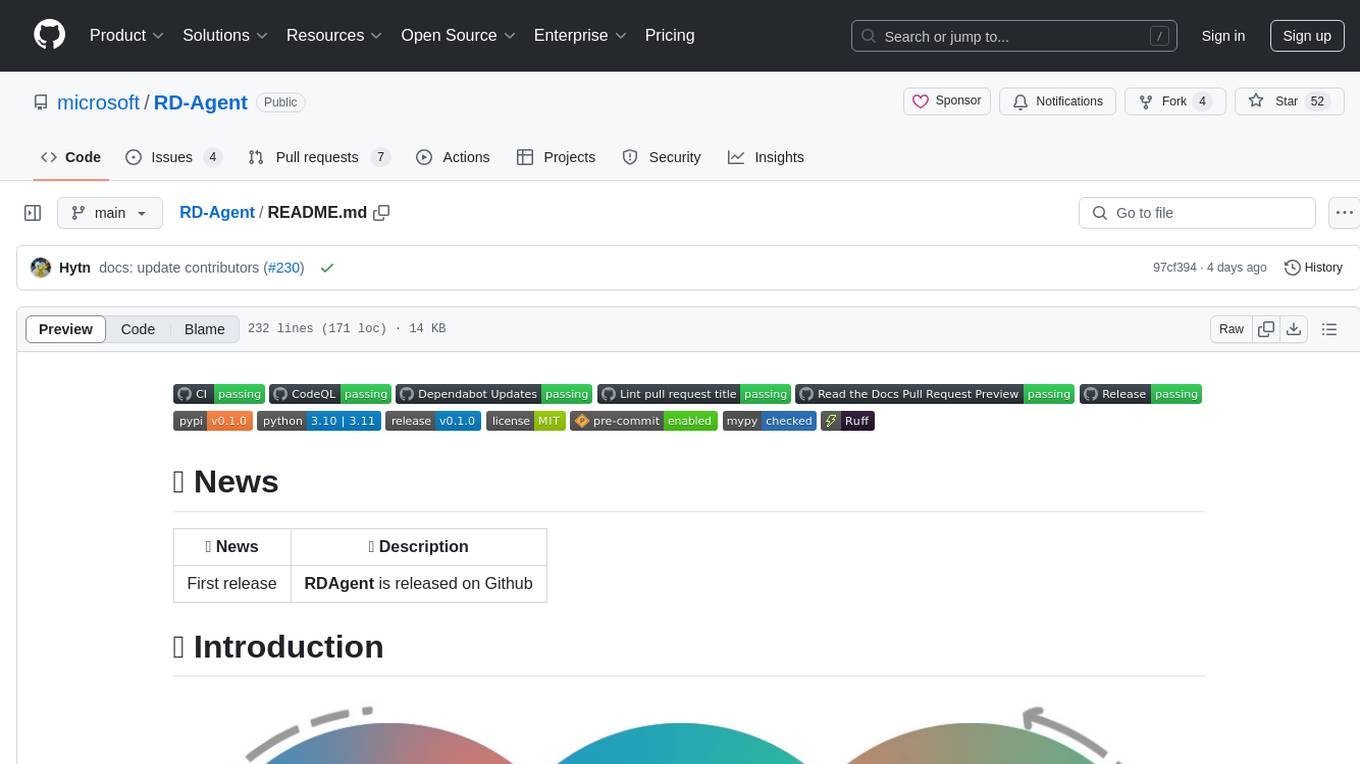
RD-Agent
RD-Agent is a tool designed to automate critical aspects of industrial R&D processes, focusing on data-driven scenarios to streamline model and data development. It aims to propose new ideas ('R') and implement them ('D') automatically, leading to solutions of significant industrial value. The tool supports scenarios like Automated Quantitative Trading, Data Mining Agent, Research Copilot, and more, with a framework to push the boundaries of research in data science. Users can create a Conda environment, install the RDAgent package from PyPI, configure GPT model, and run various applications for tasks like quantitative trading, model evolution, medical prediction, and more. The tool is intended to enhance R&D processes and boost productivity in industrial settings.
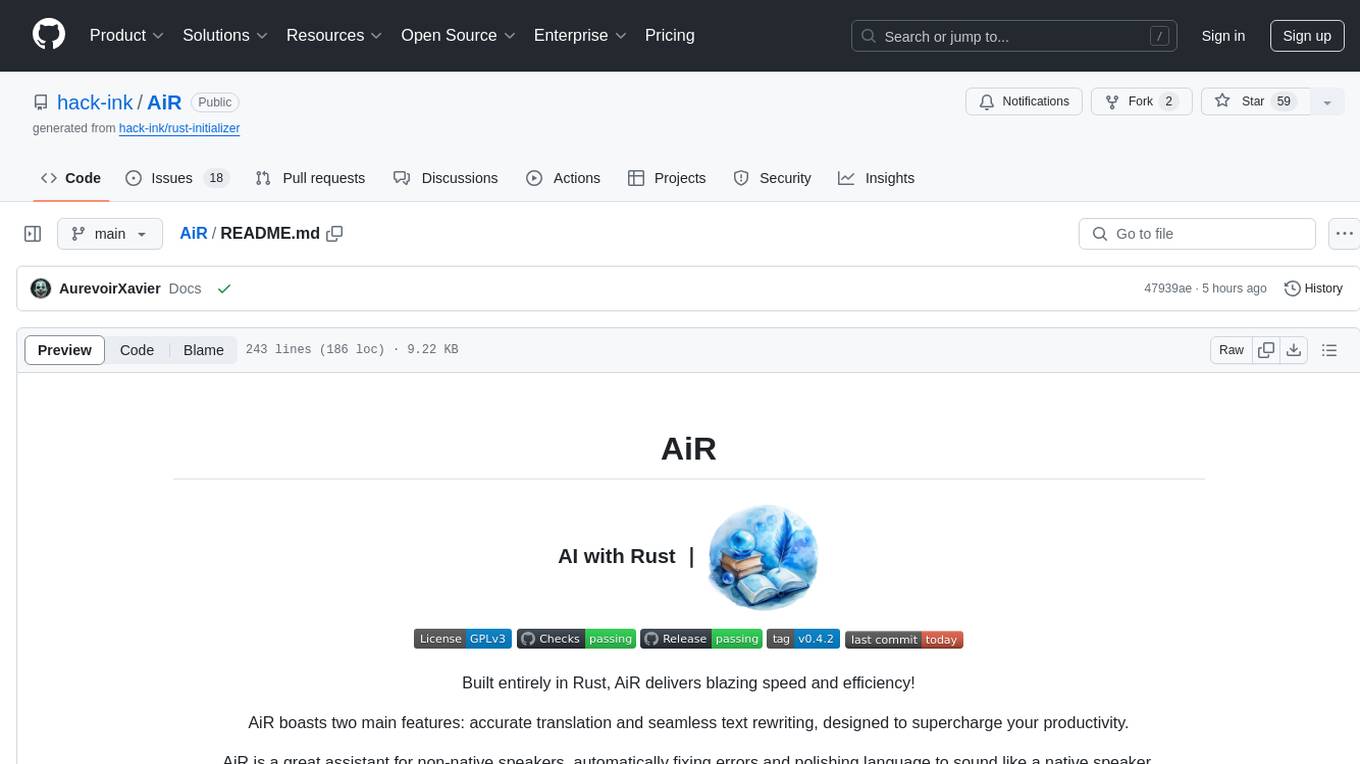
AiR
AiR is an AI tool built entirely in Rust that delivers blazing speed and efficiency. It features accurate translation and seamless text rewriting to supercharge productivity. AiR is designed to assist non-native speakers by automatically fixing errors and polishing language to sound like a native speaker. The tool is under heavy development with more features on the horizon.
For similar tasks

Azure-Analytics-and-AI-Engagement
The Azure-Analytics-and-AI-Engagement repository provides packaged Industry Scenario DREAM Demos with ARM templates (Containing a demo web application, Power BI reports, Synapse resources, AML Notebooks etc.) that can be deployed in a customer’s subscription using the CAPE tool within a matter of few hours. Partners can also deploy DREAM Demos in their own subscriptions using DPoC.

sorrentum
Sorrentum is an open-source project that aims to combine open-source development, startups, and brilliant students to build machine learning, AI, and Web3 / DeFi protocols geared towards finance and economics. The project provides opportunities for internships, research assistantships, and development grants, as well as the chance to work on cutting-edge problems, learn about startups, write academic papers, and get internships and full-time positions at companies working on Sorrentum applications.

tidb
TiDB is an open-source distributed SQL database that supports Hybrid Transactional and Analytical Processing (HTAP) workloads. It is MySQL compatible and features horizontal scalability, strong consistency, and high availability.

zep-python
Zep is an open-source platform for building and deploying large language model (LLM) applications. It provides a suite of tools and services that make it easy to integrate LLMs into your applications, including chat history memory, embedding, vector search, and data enrichment. Zep is designed to be scalable, reliable, and easy to use, making it a great choice for developers who want to build LLM-powered applications quickly and easily.

telemetry-airflow
This repository codifies the Airflow cluster that is deployed at workflow.telemetry.mozilla.org (behind SSO) and commonly referred to as "WTMO" or simply "Airflow". Some links relevant to users and developers of WTMO: * The `dags` directory in this repository contains some custom DAG definitions * Many of the DAGs registered with WTMO don't live in this repository, but are instead generated from ETL task definitions in bigquery-etl * The Data SRE team maintains a WTMO Developer Guide (behind SSO)

mojo
Mojo is a new programming language that bridges the gap between research and production by combining Python syntax and ecosystem with systems programming and metaprogramming features. Mojo is still young, but it is designed to become a superset of Python over time.

pandas-ai
PandasAI is a Python library that makes it easy to ask questions to your data in natural language. It helps you to explore, clean, and analyze your data using generative AI.

databend
Databend is an open-source cloud data warehouse that serves as a cost-effective alternative to Snowflake. With its focus on fast query execution and data ingestion, it's designed for complex analysis of the world's largest datasets.
For similar jobs

weave
Weave is a toolkit for developing Generative AI applications, built by Weights & Biases. With Weave, you can log and debug language model inputs, outputs, and traces; build rigorous, apples-to-apples evaluations for language model use cases; and organize all the information generated across the LLM workflow, from experimentation to evaluations to production. Weave aims to bring rigor, best-practices, and composability to the inherently experimental process of developing Generative AI software, without introducing cognitive overhead.

LLMStack
LLMStack is a no-code platform for building generative AI agents, workflows, and chatbots. It allows users to connect their own data, internal tools, and GPT-powered models without any coding experience. LLMStack can be deployed to the cloud or on-premise and can be accessed via HTTP API or triggered from Slack or Discord.

VisionCraft
The VisionCraft API is a free API for using over 100 different AI models. From images to sound.

kaito
Kaito is an operator that automates the AI/ML inference model deployment in a Kubernetes cluster. It manages large model files using container images, avoids tuning deployment parameters to fit GPU hardware by providing preset configurations, auto-provisions GPU nodes based on model requirements, and hosts large model images in the public Microsoft Container Registry (MCR) if the license allows. Using Kaito, the workflow of onboarding large AI inference models in Kubernetes is largely simplified.

PyRIT
PyRIT is an open access automation framework designed to empower security professionals and ML engineers to red team foundation models and their applications. It automates AI Red Teaming tasks to allow operators to focus on more complicated and time-consuming tasks and can also identify security harms such as misuse (e.g., malware generation, jailbreaking), and privacy harms (e.g., identity theft). The goal is to allow researchers to have a baseline of how well their model and entire inference pipeline is doing against different harm categories and to be able to compare that baseline to future iterations of their model. This allows them to have empirical data on how well their model is doing today, and detect any degradation of performance based on future improvements.

tabby
Tabby is a self-hosted AI coding assistant, offering an open-source and on-premises alternative to GitHub Copilot. It boasts several key features: * Self-contained, with no need for a DBMS or cloud service. * OpenAPI interface, easy to integrate with existing infrastructure (e.g Cloud IDE). * Supports consumer-grade GPUs.

spear
SPEAR (Simulator for Photorealistic Embodied AI Research) is a powerful tool for training embodied agents. It features 300 unique virtual indoor environments with 2,566 unique rooms and 17,234 unique objects that can be manipulated individually. Each environment is designed by a professional artist and features detailed geometry, photorealistic materials, and a unique floor plan and object layout. SPEAR is implemented as Unreal Engine assets and provides an OpenAI Gym interface for interacting with the environments via Python.

Magick
Magick is a groundbreaking visual AIDE (Artificial Intelligence Development Environment) for no-code data pipelines and multimodal agents. Magick can connect to other services and comes with nodes and templates well-suited for intelligent agents, chatbots, complex reasoning systems and realistic characters.






